Interview - 20th Century Women : Let's talk with Mike Mills
By Mulder, Paris, Le Bristol, 09 february 2017
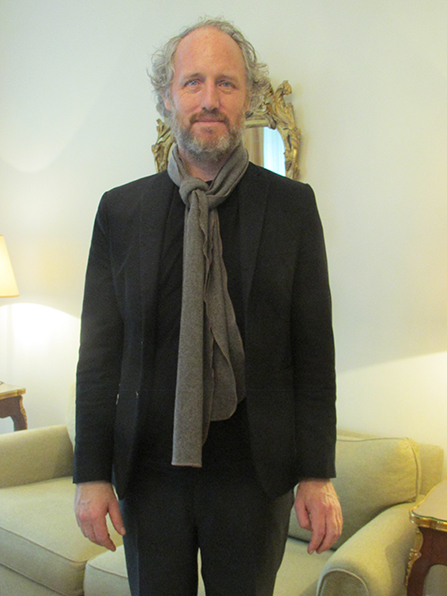
Q: First of all, thank you so much for this movie. It really haunted me in a good way. It touched my soul and I really like it. Thank you so much. I want to know how have you imagined your film and is it personal or something, maybe a personal story?
Mike Mills: It’s my Mom. It’s very much based on my mom, her autobiography. My mom was a drastic person who wanted to be a pilot. It’s also my mom sense of humor. It is also the way she looks at everything. It’s my mom story. But it is also not my mom, it is Annette Benning you know. She has brought her own spirit and body and the way she is different to my mom and also I can do a real different version of my mom. It is like a version and an attempt to capture something of my mom but it is not like a fact. And then the Greta Gerwig character came from my sister who went to New York and found punk in herself and her sexuality and then found out that she had cervical cancer and came home. That is a part of my sister. The Elle character is a sort of looser portrait of a lot of women that I knew who climbed through my window. So it starts from a very personal place, but the idea is to make a film, you know, for people, to transform it into a story.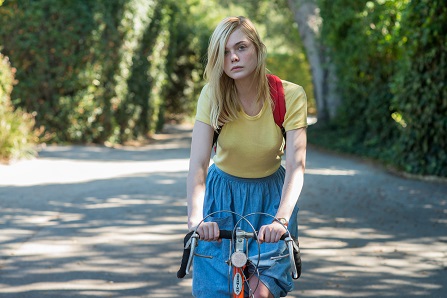
Q: After seeing this movie I wish that I had seen it sooner because it really taught me a lot, so I was wondering when your write about yourself do you wish you have done things differently and thats why you have written about your life?
Mike Mills: Of course, I wish I did some things differently. I write about my life because I feel like, I love it when other people do that. I love Ginsberg's’ poem Howl or Kaddish. There is an Hungarian director called Szabo, he made a film called father and a film called Love Films and it was very much about his life and I don’t know anything about being Hungarian. You know I am a Californian boy but it’s so real that I can relate to it. In a weird way it is doesn’t teach me about my life. I don't do it to figure out my life. I sort of exploit my life to hopefully make a film. It is a little bit more like a documentary. It talks about real life and it is not to create it. 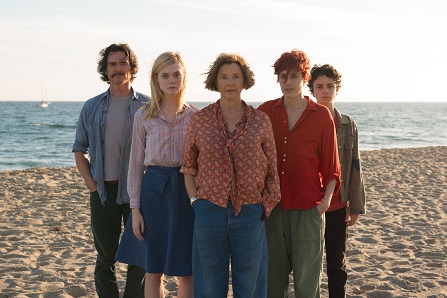
Q: What can you tell us about the symbolism of the burning car in the opening scene?
Mike Mills: It means that the father is gone. In American culture 1979 it is a sort of beginning of the end of the car, the big car, the beginning of the end of American industrial strength, the beginning of the end of Unions in America, the beginning of the end of postwar America . I’ll say it’s the end of just not the father in the story but patriarchy, the power of men.
Q: During the film I really feel like it's a porn for women. I want to know if you want to dedicate it for the USA right now because of Trump and the Women’s March?
Mike Mills: I had started to write this film in 2011 so I didn’t know about Trump or all this. But even in 2011 and especially in the context of film, the film world in America is historically very inapt at giving respect to women. So, my last film was about my dad who is also a gay man. As a white heterosexual man, I find in my position to be historically bankrupt. There is enough stories about men in the world. I don’t know how you can make a story about a white heterosexual man interesting right now or relevant or powerful. I’m sure you can, there's ways. I was very happy to write about my gay dad and having a gay man be the center of the movie and also to have these women in the center of this movie. Before Trump there is still enough misogyny and sexism. I don’t know. There is a political texture to it, but also this is my life. I love my dad and I knew I had to talk about him. My family is a sort of matriarchy, my mom and two older sisters, hold all the power in the family. So my feminism, my ideas about this really come from my life.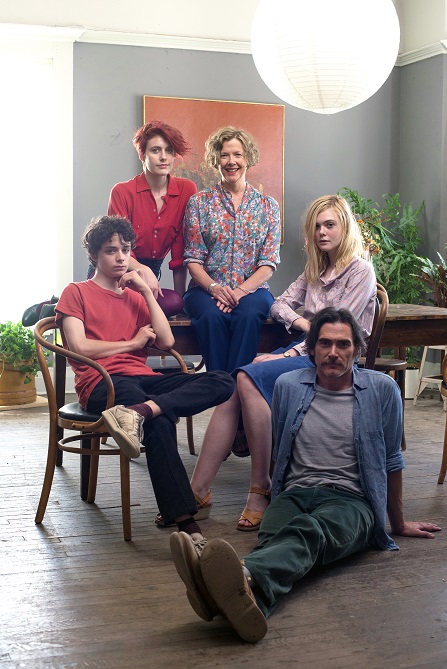
Q: Just to continue that, everybody has it own interpretation of feminism. What would be yours?
Mike Mills: My interpretation of feminism is limited by me being a guy. So I don’t feel like my interpretation of feminism is very interesting. It is interested being a man trying to be a real ally to women and to women who are feminist. My wife, my sisters, my mom, these people in my life. In my life the people who showed up, the people who really helped me, my allies, were women. They are the people who taught me about the world, how to be a man. This is where the film came from. In general feminism is a love for women and a belief and empowerment of women, you can break it down in a million ways.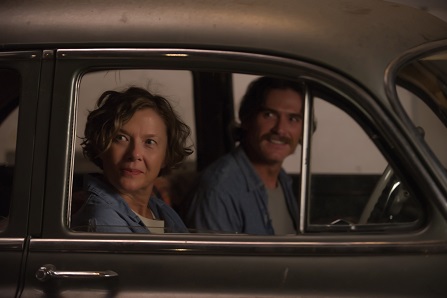
Q: What can you tell us about your collaboration on this movie with the composer Roger Neill?
Mike Mills: Roger worked on my last movie. We do Ads together. Roger really genius, he is classical trained. He teaches is classical music so he is incredibly knowledgeable. You can say to him “Whats the bridge in Let it be?”, and can tell you, you know like that. For me, I am a frustrated musician. I am a bad musician. I was in band, so to me it is like having an amazing weapon and I could say I want a little bit of Brian Eno, a little bit of the choirs from Ziggy Stardust and he can understand and put that all together. He also don’t have a big ego. He is very practical and i think that real deep musicians like Blues musicians understand that they don’t own what they do, they don’t own music, they don’t own chords. They are just practitioners of what they even inherited. Roger is very much like that. But he does all the playing on it on it, like Robert Fripp star guitar to prophet synthesizers and very organic synthesizers to piano, he plays everything on the score. He’s amazing.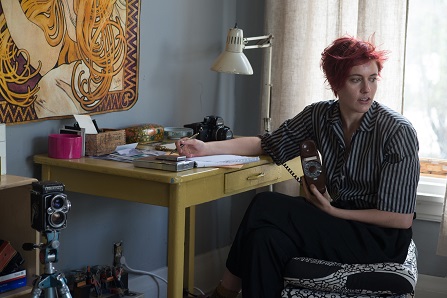
Q: I really like the menstruation scene, because I was born in a religious family and we don’t talk about it in a front of our father. I really love this scene and I would like to know how was the set?
Mike Mills: It was very fun. It took a long time. For a dinner scene like that, like someone who is looking here or to you, you have to change the camera positions. So there are like twelve camera positions. It took six hours to shoot just for that one scene. It was very fun. Greta is following the structure of what I wrote. Ninety percent what i wrote. But than Greta would add things you know and than that made Billy add something too. I like the actors to play with my lines but Billy saying “don’t have sex just with the vagina but have sex with the whole woman”. He improvised that. Based on Greta talking about the vagina, she added, your going have sex with a vagina, vagina going to have a period you know.But that comes from my wife too. My wife is very menstruation proud. She has a very funny story with her family when she was very young like twelve, she sat her older brother down who was five years older than her, and told to him how important it is to be able to talk about menstruation without shame. I took that part of her. The set was both hard and fun. People really enjoy. It is like a “Howard Hawk scene to me” like to have or have not, or its like a 30’s film piece, because there is a lot of little quick dialog and it was very hot because we filmed that at the end summer. Everyone is just sweating. It was also hard because the geometry of the camera work is actually really tricky.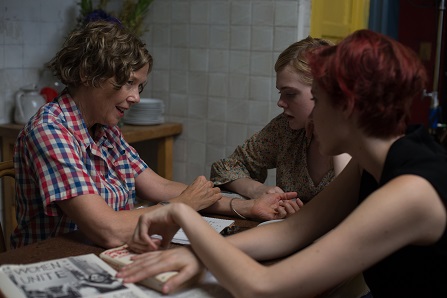
Q: In Beginners and 20th century women you have this discussion between generations. Is it because we are losing the interest about the past?
Mike Mills: For me it is very personal because my parents were forty years old when they had me in 1966 so back then nobody was that old and moms they were all younger. My parents were born in the twenties (1925), I was born in 1966 and that is such a huge generation gap. They grew up during the depression. My dad was drafted in the World War II, he was eighteen. My mom trying to be a pilot in the World War II so their life was so different than mine. The Vietnam War was happening, but it didn't affect me. I grew up a skate boarding punk rock therapy. Their world was so different. My psyche is built around this huge generation gap and I trying to explain my parents to the world, to my friends and trying to explain my friends to my parents. These films are both doing that. I am also really interested in historical consciousness and how our inner lives, our personal lives are very much shaped by this moment in history. So, my dad sexuality was literally illegal. My dad knew he was gay when he was twelve (in 1937). This is a vivid example of history allows or disallows things, or encourages and discourages very intimate things. I find that really interesting. This is a personal and political tie.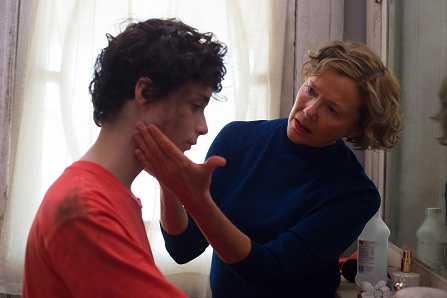
Q: What was the biggest challenge, as a writer/director that you have met during the production of this film ?
Mike Mills: Being a writer. Writing is very hard and took me two or three years. I don’t write normally. I don’t think of a plot and structure. I think in characters, history and how the person is political. I think about these things and it is very hard to turn that into a story. I love writing and also don’t love writing. I love writing. I know a lot of writers that said I will do it, i am not like that. I get depressed and I feel like i will fail, that I must put it down.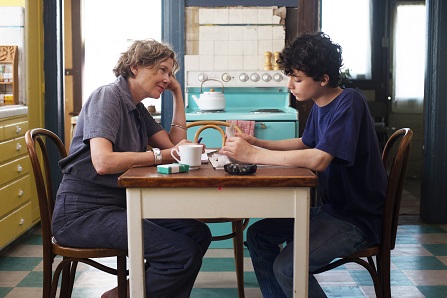
Q: I read that you have directed a lot of video clips. Are you interested about making a musical?
Mike Mills: I kinda of am thinking about it. I love music videos, music videos were like my film school. They were really my film school. Music videos taught me about story because all my music video are stories and not the band playing. I saw them as a short films. I have something pay off. In the end of three minutes something happens. This is a really interested education that you have, you can only learn by doing it, by thinking about films. You have to make stuffs. I have often thought about a sort of musical thing. I saw La La Land and I like it. It also like Jacques Demy, so French in a way. Once I did a thing for Marc Jacobs with Milla Jovovitch. It was her in a forest singing Hurdy Gurdy Man, a Donovan song but it was like Dogma, no additional music, just her and the sounds of the world. I can do a musical like that, like a dogma musical.
Q: The movie has passed a lot of messages, open mindedness, kindness. Do you feel that is hard to be a descent person in our society today?
Mike Mills: How can I answer this question (joking)?. I think that in some way my films are annoying kind. It is hard for me to have bad guys, villains, or negativity. I think that to be too positive is also a problem. If I have a critic of my films, it is that I have trouble integrating the negative and the positive. I don’t think is hard to be a kind person. I think that society in general, our society in general particularly learns now, America right now, maybe France in a minute it is very unkind. It is very divisive. It is tricky times, in general. The Jimmy Carter speech in my movie, to have a political leader, the president, and its a very particular American thing, is that he is Christian, like an American Christian, of his kind is very particular person. He’s a farmer, he’s a peanut farmer, so he is very kind of working class, a Christian man that makes him very emphatic. That is very impossible now, even Obama can not be as sweet as Jimmy Carter. I think historically we are in a moment where that kindness is on the retreat. It is easy to be kind. The power is circulating around. its not like hate, its diversionary consciousness, us and them stuff and American is really crazy right now. 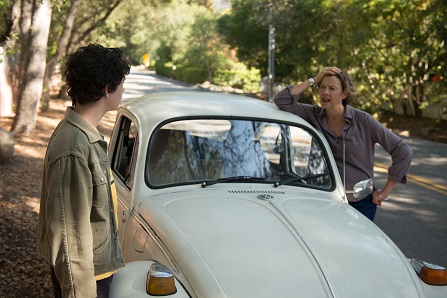
Our Paris Premiere video of the 20th Century Women
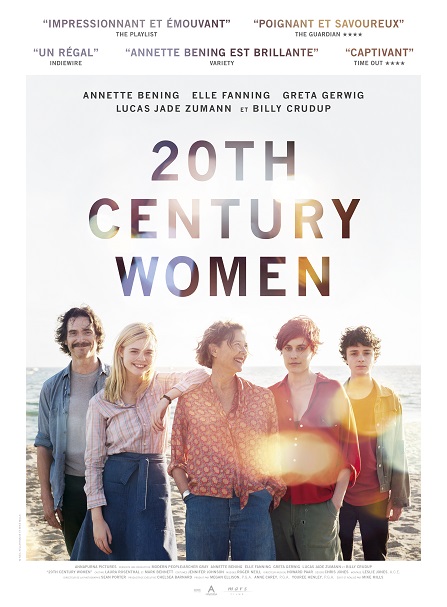
Synopsis:
During the summer of 1979, a Santa Barbara single mom and boardinghouse landlord (Annette Bening) decides the best way she can parent her teenage son (Lucas Jade Zumann) is to enlist her young tenants - a quirky punk photographer (Greta Gerwig), a mellow handyman (Billy Crudup) and her son's shrewd best friend (Elle Fanning) - to serve as role models in a changing world.
20th Century Women
A film writted and directed byMike Mills
With Annette Bening (Dorothea), Elle Fanning (Julie), Greta Gerwig (Abbie), Billy Crudup (William), Lucas Jade Zumann (Jamie), Alison Elliott (Mère de Julie), Thea Gill (Mère d’Abbie), Vitaly Andrew LeBeau (Jamie jeune)
France Distributor : Mars Films
(Many thanks to Delphine Olivier for allowing us to interview the writer and director Mike Mills. A small dedication to our colleagues Pauline Wang (Madmoizelle.com) and Cynthia Hamani (Ecran noir) with whom we shared this interview. I would also like to thank Novias, our US correspondent and editor for his precious help)

